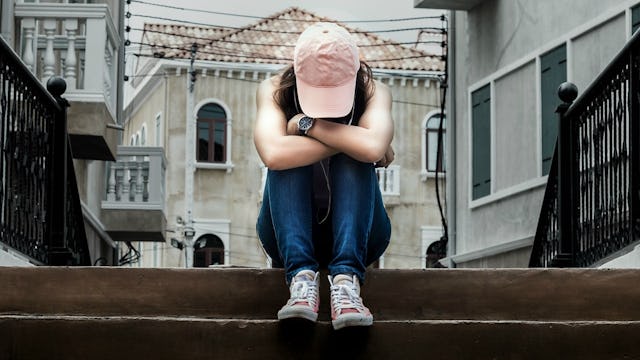My Secret Struggle With Trichotillomania

“Mommy, don’t pull your hair out!”
My heart lurched when he said it. It’s one thing to have a self-inflicting habit, but it’s a whole other ballgame when you have children watching you. My son may only be 3 years old, but he’s watching my every move.
I’ve struggled with trichotillomania since I was a little girl. I remember pulling my eyebrows and eyelashes out as a kid. One time, I pulled all my eyebrow hairs out on one side. I tried to draw it back in with makeup, and I looked nothing short of ridiculous. My cousin called me out on it. “Did you draw your eyebrow?” she squealed. That was the first time I realized people might be noticing this strange, secret habit of mine.
I use the word secret in bold letters. Because although I would pull my hair out in the open, no one ever talked about it. My family never mentioned it. Friends, boyfriends, colleagues, it’s been the elephant in the room my whole life. I remember being on a bus in Madrid in college, hastily tearing out hairs from my scalp one strand at a time when an older woman walked up to me and started cussing me out in Spanish. “Freak, crazy, bitch…” Those are the words I could make out from her tirade. I was stunned more by the fact that a stranger on a bus called me out than by what she actually said, in fact. Even now, it’s the only time a stranger has confronted me on my disorder.
Disorder is such an ugly word, isn’t it? I mean, I’m not dying here. I’m pulling out hair one follicle at a time. It doesn’t hurt. It feels good, in fact. It sounds weird, I know. Oh, I know. It’s not terribly uncommon though. The American Journal of Psychiatry estimates as many as 2% of the population has trichotillomania. Celebrity (and my woman crush) Olivia Munn speaks openly about her struggles with it.
Sadly, there is no quick fix for treatment. Hell, there’s no “long” fix for treatment either. I’ve been to psychiatrists, psychologists, and therapists for this problem. I’ve taken medications — all of them, it feels like — to stop the habit. I’ve worn wigs, hats, gloves. I’ve rubbed essential oils, Rogaine, and castor oil on my scalp. I’ve tried hypnotherapy. I’ve prayed. Dear God, I have prayed. Nothing helps. I simply cannot stop.
I’m lucky too. Most people don’t see my bald patches in my hair. Most people assume I’m naturally fine-haired. Most people think I like keeping my hair short, in ponytails, and under hats. Newsflash: I don’t. I dream of long, thick, lush hair. I pine for the day I can let my hair down, without my minute-to-minute urge to tug, pull, and tear. But I know it could be worse. For many, it is worse. I’ve read stories of others who’ve had to shave their heads. I’ve seen pictures of women with naked scalps, those who are unable to hide the disorder.
When someone uses the expression “makes me want to tear my hair out,” I cringe. I know that feeling only too well. Everything makes me want to tear my hair out. Anxiety, boredom, stress. Watching TV, sitting in front of the computer, or driving the car. I pull out hairs one at a time until they form a pile on the floor. I gather the pile up often, hoping to throw away the evidence, leave a fresh slate.
Many of the professionals I’ve seen eventually would write off the problem. Yes, it’s a problem and I want it to cease, but I’m not hurting anyone so perhaps I can let bygones be bygones. I would leave their offices feeling hopeless, like a transparent “Case Closed” sign was floating above me. Never feeling fully satisfied. Always wondering if this is something I would struggle with for the rest of my life. And this morning, as I heard my son plead for me to stop pulling my hair this morning in the car, I wondered, Am I really not hurting anyone? Is this not impacting my children at all?
Today is the first time I’ve spoken up about my trichotillomania. Prior, I’ve hidden this disorder amongst myself and my closest of family. Like many genetic disorders, there’s no cure and very little research on the subject. Maybe I will struggle with this my whole life, or maybe I’ll conquer it. But now that I’m a mom, I feel a whole new level of concern take over.
Will my kids struggle with this disorder? Will they watch me and feel inclined to follow suit? Or worse, will they think I’m a freak… crazy…?
I’m a glass-half-full kind of person. I recognize that in the world we live in, this is one of the better problems people would opt for on a multiple choice questionnaire. I count my blessings. But I still pray. I pray for healing and recovery. I pray for an end to the shame and self-loathing. And I pray my behavior doesn’t affect my kids, will not impact their behavior, and will not discompose how they see me. Because right now I’m a superhuman to these little people, and my heart breaks for the day I’m downgraded to simply “human.”